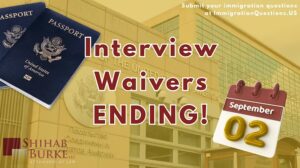On June 23, 2021, U.S. Citizenship and Immigration Services (USCIS) announced that it will accept certain resubmitted H-1B petitions for fiscal year 2021. This will apply only to H-1B petitions which were rejected or administratively closed due to the fact that the requested start date listed in the petition was after October 1, 2020.
The petition must be resubmitted with all applicable fees to the address provided by USCIS on their website. The petition must be resubmitted by October 1, 2021 in order to be considered as filed on the original due date.
Below are the things you should include with your FY 2021 H-1B petition resubmission:
- FY 2021 H-1B cap registration selection notice
- Rejection or administrative closure notice for the original FY 2021 H-1B cap petition (if applicable)
- Brightly colored coversheet indicating that you are refiling an FY 2021 H-1B cap case that was originally rejected or administratively closed solely because your petition was based on a registration submitted during the initial registration period, but you requested a start date after Oct. 1, 2020. This will help ensure that it is reviewed upon receipt.
- Any applicable filing fees
H-1B Electronic Registration
To understand the recent USCIS announcement to accept resubmissions, we must look at the process for applying for a cap-subject H-1B visa.
In 2020, USCIS implemented an electronic registration process for the H-1B cap. The electronic H-1B registration process is a preliminary step an employer must complete each fiscal year before they can file H-1B visa petitions on behalf of foreign nationals with specialized degrees (also known as “requested workers”) who have never had H-1B status.
To submit an electronic registration, you must have a myUSCIS account. Refer to this step-by-step guide for creating your account.
Once the registrant (employer) has submitted an electronic H-1B registration for each beneficiary (requested worker), and paid the required $10 per beneficiary, you must wait to hear back whether your registration has been selected via a lottery process. If selected, the registrant can then file the H-1B visa petition.
According to USCIS, “The electronic registration process has streamlined processing by reducing paperwork and data exchange and provided overall cost savings to employers seeking to file H-1B cap-subject petitions.” Thus, instead of directly filing an H-1B cap-subject petition, the electronic registration process is a sort of pre-screening system that indicates which petitioners can actually file a petition.
Before this electronic registration system, H-1B visa petitions were filed for anyone wishing to apply. For example: out of the 250,000 petitions filed in 2019, only 85,000 of those were approved. Meaning a large chunk of petitions filed with USCIS that were rejected had to be mailed back.
The registration process attempts to streamline the process by reviewing only the petitions filed because of a selected registration. The result is reduced paperwork and data exchange, along with a much welcome cost savings for employers.
Refer to our blog covering common questions regarding this electronic registration process.
Yet the number of H-1B petitions actually filed for FY 2021 was below the numerical allocations, meaning that USCIS could accept more petitions for review. This was likely due to two major issues.
The first is the devastating effect of the COVID-19 pandemic which caused economic, political, and social uncertainty around the globe. The second reason is that FY 2021 was the first time that the electronic registration was introduced, potentially leading to a lack of familiarity with how the system works.
Therefore, in August 2020, USCIS selected another batch of registrations that were held in reserve. For these “second wave” selected registrations the filing period ended on November 16, 2020, which led some petitioners to list a start date which was after October 1, 2020.
Due to this discrepancy of the filing deadline being after the required employment start date, USCIS has decided that regulations do not require the rejection or administrative closure of such petitions. Hence it is allowing petitioners to resubmit such erroneously rejected or closed petitions for review. This does not mean that a petition will be approved, but simply that the employment start date will not be a reason for rejection or closure of the case.
Importance of H-1B Visa
According to Outlook India, the H-1B visa is “the most sought-after non-immigrant visa among Indian IT professionals, which allows US companies to employ foreign workers in specialty occupations that require theoretical or technical expertise and knowledge.” U.S.-based technology companies rely on this visa to be able to hire foreign talent from countries such as India and China.
For example, Study International provides some insight into the numbers behind the visas: “In 2019, USCIS approved 388,403 H-1B petitions, with close to 72% of successful applicants coming from India. They consisted of 54% master’s degree holders and 66% planning to work in IT.”
The temporary work visa has had a rocky road since the Trump administration had banned the H-1B visa via executive order in June 2020. The Biden administration allowed that order to expire on March 31, 2021, to restore the pipeline for skilled foreign workers coming to the U.S.
There have even been calls to double the H-1B visa quota amidst concerns that the U.S. is facing a worker shortage. The lack of qualified workers to fill all the open job positions can have a negative impact on the ability of the U.S. to make a meaningful economic recovery after the devastation of the COVID-19 global pandemic.
Considering the ever-changing immigration law environment, it is wise to consult a skilled immigration lawyer to make sure you have all the current information in moving through the U.S. immigration system.
Shihab Burke LLC Immigration Lawyers Can Help
If you are an immigrant with any questions or concerns regarding your immigration case, H-1B visas, green card applications, or any other legal matter, speak at once to an experienced Columbus immigration attorney. A good immigration lawyer can help you and your family with any immigration issues you face and defend you if you’re accused of violating immigration law.
Our immigration attorneys will review your forms and applications for thoroughness and accuracy. Immigration laws will continually change, but an experienced immigration attorney will always be able to give you the most up-to-date immigration advice you need.
We have offices in Dublin and Columbus, Ohio, Michigan, and Texas. But our full suite of immigration law services is available to clients nationwide and even around the world.
Contact us today!









